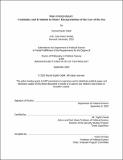Mare interpretatum : continuity and evolution in States' interpretations of the Law of the Sea
Author(s)
Odell, Rachel Esplin.
Download1249948734-MIT.pdf (6.602Mb)
Alternative title
Continuity and evolution in States' interpretations of the Law of the Sea
Other Contributors
Massachusetts Institute of Technology. Department of Political Science.
Advisor
M. Taylor Fravel.
Terms of use
Metadata
Show full item recordAbstract
Disagreements over how to interpret the international law of the sea have caused contention among the United States, China, and other Asian nations as the regional balance of power has shifted in recent decades. This dissertation examines the sources of those disagreements, investigating why states favor mare liberum ("the free sea"), claiming limited jurisdiction over the oceans, or mare clausum ("the closed sea"), claiming expansive authority at sea, and how their interpretations change over time. I argue that countries interpret the law of the sea in ways that serve their strategic interests, treating the ocean as neither mare liberum nor mare clausum, but instead mare interpretatum. In their legal interpretations, states balance their interests in protecting against perceived threats along their own coasts with their interests in conducting operations near other states' coasts, while also seeking legitimacy in the international community. States are reluctant to change their interpretations lest they incur hypocrisy costs, but they still often find ways to adapt to shifting material circumstances by exploiting ambiguity in their past rhetorical positions to alter their claims subtly. I illustrate this argument by analyzing how countries have interpreted the law of the sea across time and space, coupled with in-depth qualitative case studies of China, Japan, the United States, and the Soviet Union, drawing upon archival materials, government statements, legal commentaries, and interviews with more than 100 officials and experts in six countries. My principal case study traces evolution in China's interpretations of the law of the sea governing foreign military activities in territorial seas, straits, and exclusive economic zones; maritime entitlements of islands; and historic rights and waters. I find that despite the history of U.S.-China competition over the meaning of "freedom of navigation," China's interpretation of this principle has begun converging with the U.S. interpretation as its own naval power has grown. At the same time, facing perceived threats to its maritime interests, Beijing has made expansive legal claims in the South China Sea, damaging its legitimacy among its neighbors. These dynamics will play a crucial role in shaping prospects for maritime peace and security in Asia.
Description
Thesis: Ph. D., Massachusetts Institute of Technology, Department of Political Science, September, 2020 Cataloged from the official PDF version of thesis. Includes bibliographical references (pages 481-509).
Date issued
2020Department
Massachusetts Institute of Technology. Department of Political SciencePublisher
Massachusetts Institute of Technology
Keywords
Political Science.